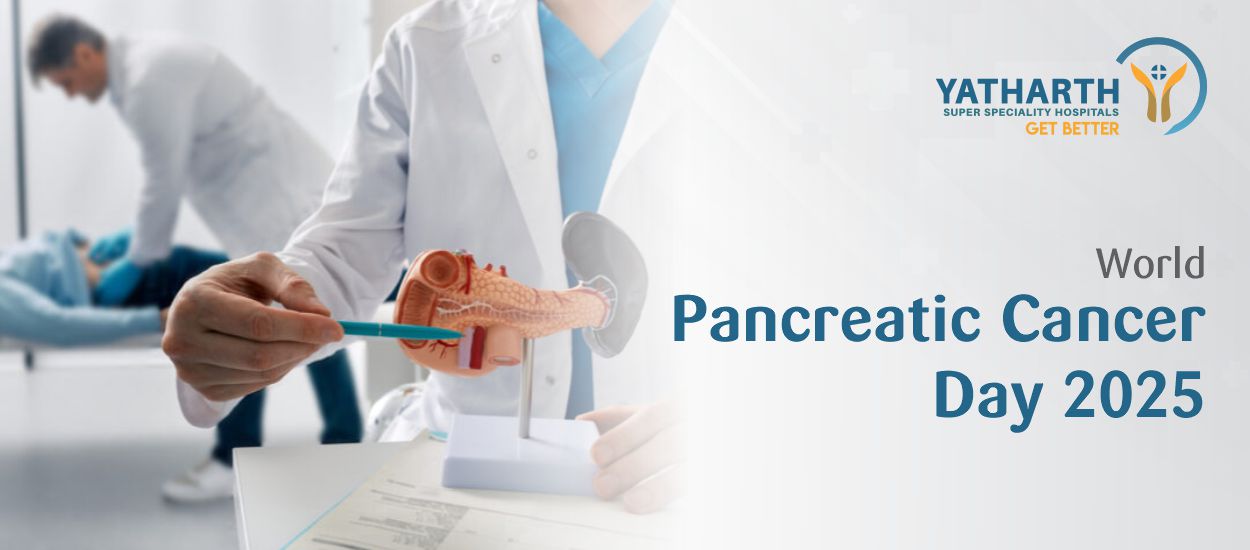Pancreatic cancer is one of the most aggressive and life-threatening cancers, often detected after it has reached an advanced stage, as its early symptoms are subtle and easily mistaken for common digestive issues. According to the World Health Organization, pancreatic cancer remains among the leading causes of cancer-related deaths globally, with survival rates improving significantly if diagnosed at an early stage. World Pancreatic Cancer Day is observed to serve as a reminder of the importance of early recognition, research, and timely access to care. The 2025 observance encourages individuals and healthcare communities to unite in spreading knowledge about the warning signs, risk factors, and modern treatment options available today. More on this topic, in this article, we will explore the causes, signs, diagnosis, and treatment approaches that help improve outcomes for pancreatic cancer patients.
What is Pancreatic Cancer?
The pancreas is a small organ located behind the stomach that helps digest food and control blood sugar by producing insulin and other important enzymes. Pancreatic cancer occurs when some cells in the pancreas start multiplying abnormally and form a lump called a tumour that interferes with normal digestion and hormonal functions.
Most pancreatic cancers develop when tumours form in the tiny ducts that transport digestive enzymes - a condition known as pancreatic ductal adenocarcinoma (PDAC). In some cases, cancer begins in the hormone-producing cells of the pancreas, resulting in pancreatic neuroendocrine tumours (NETs). When these cancerous cells continue to grow, they can spread to nearby organs and blood vessels, making early detection extremely challenging.
Because the pancreas is deep inside the abdomen, early changes often go unnoticed. By the time symptoms appear, the disease may have already spread, making early awareness and timely diagnosis vital for better outcomes.
History and Significance of World Pancreatic Cancer Day
World Pancreatic Cancer Day is observed every year in November (20th Nov in 2025) as part of Pancreatic Cancer Awareness Month, a global initiative dedicated to improving understanding of one of the most aggressive forms of cancer. The observance was started by the World Pancreatic Cancer Coalition (WPCC), a network of organisations working together to highlight the importance of early detection, better treatment, and stronger patient support systems.
The day offers an opportunity for patients, caregivers, healthcare professionals, and researchers to come together to raise awareness about the early warning signs of pancreatic cancer and the challenges associated with its diagnosis. Communities across the world come together through educational campaigns, survivor stories, and fundraising events to encourage early check-ups and inspire hope.
In 2025, the campaign’s official theme, “Hello Pancreas,” emphasises the need to understand this vital organ’s function, recognise its warning signs, and promote early detection through greater public awareness.
Causes and Risk Factors of Pancreatic Cancer
The exact cause of pancreatic cancer is not always known, but it usually develops when changes (mutations) occur in the DNA of pancreatic cells. These mutations cause cells to grow and divide uncontrollably, eventually forming a tumour. While some cases occur without any clear reason, several known factors can increase a person’s risk of developing the disease.
Common risk factors include:
-
Age: The risk increases with age, with most cases diagnosed in individuals over 60 years.
-
Smoking: Regular tobacco use significantly raises the likelihood of developing pancreatic cancer.
-
Family history: Having a close relative with pancreatic cancer, or carrying certain inherited gene mutations such as BRCA2 or PALB2, can elevate risk.
-
Chronic pancreatitis: Long-term inflammation of the pancreas, often caused by heavy alcohol consumption or gallstones, may lead to cancerous changes over time.
-
Diabetes: Long-standing diabetes, or a sudden onset of diabetes in older adults, can sometimes indicate underlying pancreatic disease.
-
Obesity: Excess body weight, particularly around the abdomen, increases the risk of pancreatic cancer.
-
Dietary factors: Consuming diets high in red or processed meats and low in fresh fruits and vegetables may contribute to the development of pancreatic cancer.
Early Signs and Symptoms to Watch For
Pancreatic cancer often develops quietly, and its early signs can be vague or mistaken for other digestive issues. However, recognising these warning symptoms early and consulting a doctor can make a crucial difference in treatment success.
Common symptoms include:
-
Abdominal or back pain: Persistent pain in the upper abdomen that may spread to the back.
-
Unexplained weight loss: Sudden weight loss without changes in diet or physical activity.
-
Jaundice: Yellowing of the skin and eyes, often caused by blockage of the bile duct.
-
Loss of appetite and nausea: Feeling full quickly or experiencing nausea after meals.
-
Changes in stool colour: Pale or greasy stools that float, indicating poor fat digestion.
-
Fatigue: Constant tiredness or weakness, even with adequate rest.
-
New-onset diabetes: In some cases, sudden development of diabetes may signal pancreatic changes.
These symptoms may not always mean cancer, but persistent or worsening signs should never be ignored. Seeking timely medical evaluation and diagnostic tests can help detect the disease early, when treatment is most effective.
Stages and Progression of Pancreatic Cancer
Like most cancers, pancreatic cancer is classified into stages based on how far it has spread. Staging helps doctors determine the severity of the disease and plan the most effective treatment approach. The main stages include:
-
Stage 0 (Carcinoma in situ): Abnormal cells are present in the pancreas but have not yet become cancerous or spread.
-
Stage 1 (Localised): The cancer is confined to the pancreas and may be treatable with surgery.
-
Stage 2 (Regional spread): The tumour has grown beyond the pancreas into nearby tissues or lymph nodes.
-
Stage 3 (Locally advanced): The cancer involves major blood vessels near the pancreas, limiting surgical options.
-
Stage 4 (Metastatic): The cancer has spread to distant organs such as the liver, lungs, or abdomen.
Screening and Diagnosis
Pancreatic cancer can be difficult to detect in its early stages because it often shows no clear symptoms. While there is currently no universal screening test for the general population, individuals at higher risk can benefit from regular monitoring and diagnostic evaluation. Early detection significantly improves treatment outcomes and survival rates.
Doctors use several methods to diagnose pancreatic cancer, such as:
-
Blood tests: Measurement of tumour markers such as CA 19-9 can help identify possible pancreatic cancer, though they are not used alone for diagnosis.
-
Imaging tests: Techniques such as CT scan, MRI, PET-CT, and ultrasound help visualise the pancreas and surrounding organs.
-
Endoscopic ultrasound (EUS): A thin tube with an ultrasound probe is inserted through the mouth to capture detailed images of the pancreas.
-
Biopsy: A small tissue sample is taken and examined under a microscope to confirm cancer.
-
Genetic testing: Recommended for people with a strong family history or inherited mutations linked to pancreatic cancer.
Modern Treatment Approaches and Progress in Pancreatic Cancer Care
Pancreatic cancer treatment has advanced considerably, combining surgery, medication, and technology to improve survival and quality of life. The approach depends on the stage of cancer, tumour location, and the patient’s overall condition.
Key treatment options and recent advancements include:
-
Surgery: The primary curative approach for early-stage cases, including procedures such as the Whipple surgery (pancreaticoduodenectomy), which removes the tumour and nearby tissues to prevent spread.
-
Chemotherapy: Used before or after surgery to shrink tumours or control their growth in advanced stages.
-
Radiation therapy: Targets cancer cells using high-energy beams, often combined with chemotherapy for better results.
-
Targeted therapy: Focuses on specific genetic mutations within cancer cells, minimising damage to healthy tissue.
-
Immunotherapy: Stimulates the immune system to recognise and destroy pancreatic cancer cells more effectively.
-
Minimally invasive surgery: Laparoscopic and robotic-assisted techniques reduce recovery time, pain, and risk of complications.
-
Precision medicine: Personalises treatment based on the patient’s genetic profile, improving the effectiveness of care.
-
Research and innovation: Ongoing studies are exploring gene-based therapies and biomarkers for early detection and tailored treatment strategies.
Recent advances, such as robotic-assisted surgery, precision medicine, and molecular testing, have made treatment safer and more precise. These innovations help reduce recovery time, minimise complications, and improve treatment outcomes for patients facing pancreatic cancer.
Preventive Measures for Pancreatic Cancer
While not all cases of pancreatic cancer can be prevented, adopting healthy lifestyle habits can help lower the risk. Awareness of personal and family risk factors, along with timely medical evaluation, can make a significant difference in early detection and prevention.
Simple steps that may help reduce the risk include:
-
Quit smoking: Avoid tobacco in all forms, as smoking significantly increases pancreatic cancer risk.
-
Limit alcohol intake: Excessive drinking can lead to chronic pancreatitis, a known risk factor for pancreatic cancer.
-
Maintain a healthy weight: Engage in regular physical activity and follow a balanced diet to prevent obesity.
-
Eat a nutritious diet: Include fruits, vegetables, whole grains, and foods rich in dietary fibre to support digestive and metabolic health.
-
Manage diabetes and pancreatitis: Regular monitoring and appropriate medical care can help reduce complications linked to these conditions.
-
Get regular health check-ups: Those with a family history of pancreatic cancer or genetic risk should undergo periodic screenings.
These small but consistent lifestyle changes can go a long way in supporting pancreas and overall health.
How Can You Contribute to Pancreatic Cancer Awareness?
Raising awareness about pancreatic cancer is a shared responsibility. Each person can play a part in helping others understand the disease, recognise its early signs, and encourage timely medical attention. Small actions, when multiplied across communities, can create meaningful change. Here’s how You can contribute towards the cause:
-
Share accurate information: Use your social media or community groups to spread facts about pancreatic cancer symptoms, risk factors, and the importance of early diagnosis.
-
Encourage timely check-ups: Remind family members, friends, and colleagues, especially those at higher risk, to schedule regular health screenings.
-
Support patients and families: Offer emotional support, donate to cancer support groups, or volunteer in awareness drives.
-
Join awareness events: Participate in activities organised on World Pancreatic Cancer Day to help amplify the message of hope and early detection.
-
Advocate for better care: Support efforts that fund research, improve access to advanced treatment, and strengthen healthcare services.
Every conversation, awareness post, and act of compassion brings society one step closer to early detection, better treatment, and improved survival for those affected by pancreatic cancer.
Why Choose Yatharth Hospital for Pancreatic Cancer Care?
At Yatharth Hospital, pancreatic cancer care is guided by a commitment to precision, compassion, and comprehensive expertise. As one of the leading NABH-accredited multispeciality hospitals in Noida and Greater Noida, Yatharth combines advanced technology with a patient-first approach to ensure early diagnosis, effective treatment, and holistic recovery. We offer:
Experienced Oncologists and Gastroenterologists
Yatharth Hospital’s team of skilled oncologists, gastroenterologists, and hepatobiliary surgeons work together to diagnose and treat pancreatic cancer using the latest clinical protocols. With experience in managing complex and advanced-stage cases, our team of specialists ensure every patient receives a tailored treatment plan that maximises safety, comfort, and recovery.
Advanced Diagnostic and Surgical Technology
The hospital is equipped with state-of-the-art imaging systems such as CT, MRI, PET-CT, and endoscopic ultrasound, which allow for accurate detection, staging, and monitoring of pancreatic tumours. These advanced technologies help specialists identify the tumour’s size, location, and spread with precision, enabling tailored treatment planning. Minimally invasive and robotic-assisted surgical techniques further enhance accuracy and safety during tumour removal, significantly reducing pain, hospital stay, and recovery time. By integrating cutting-edge diagnostics with advanced surgical care, the hospital ensures better treatment outcomes and an improved quality of life for patients with pancreatic cancer.
Personalised and Multidisciplinary Care
Every patient at Yatharth Hospital receives a personalised care plan developed through collaboration among oncologists, surgeons, radiologists, dietitians, and physiotherapists. This multidisciplinary model ensures that both medical and emotional aspects of care are addressed at every stage of the journey.
Comprehensive Rehabilitation and Support
Beyond treatment, Yatharth Hospital provides dedicated rehabilitation and follow-up programmes to help patients regain strength and confidence after surgery or chemotherapy. Psychological counselling, nutritional support, and regular health monitoring are integral to each patient’s long-term recovery and quality of life.
Through its combination of clinical excellence, modern technology, and compassionate care, Yatharth Hospital continues to stand as a trusted centre for pancreatic cancer diagnosis and treatment in Noida and the Delhi-NCR region.
Building Hope Through Awareness and Early Action
Pancreatic cancer continues to challenge patients and doctors alike, but awareness and early action can make a life-changing difference. Recognising the warning signs, staying informed about risk factors, and seeking timely medical advice can lead to earlier diagnosis, more effective treatment, and better long-term outcomes.
At Yatharth Hospital, a team of experienced oncologists, gastroenterologists, and surgeons work together to provide comprehensive pancreatic cancer care using advanced technology and a patient-centred approach. From early diagnosis to post-treatment rehabilitation, every step is guided by precision, compassion, and expertise.
To book an appointment or consult a specialist at Yatharth Hospital, call +91-9582833333. You can also schedule your consultation through our online booking portal.

















